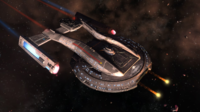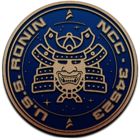USS Ronin/Small Craft
| USS Ronin | ||
|---|---|---|
 ACTIVE STATUS | ||
| ||
The following auxiliary craft are assigned to the USS Ronin:
Squadron Organization
The Ronin's Space Wing is divided into 4 squadrons. Three of these are tactical fighter squadrons, with a fourth support squadron.
Commander-Air Group: Goblin (callsign - Goblin)
- Wildcards: This squadron flies the FA-150 Maul.
- Squadron Commander: unassigned
- Black Adders: This squadron flies the FA-120 Falchion.
- Squadron Commander: unassigned
- Katanas: This squadron flies the FA-120 Falchion.
- Squadron Commander: unassigned
- Mustangs: This squadron includes the FA-150R Mongooses, as well as the ship's support vessels, including the shuttles, runabouts, and workbees. The Mustangs are also responsible to test-piloting.
- Squadron Commander: unassigned
Tactical Vessels
The Ronin's Carrier Space Wing consists of 16 FA-150 Mauls, 32 FA-120 Falchions and 4 FA-150R Mongooses.
StarFleet Marine Corps FA-150 Fast Attack Space Superiority Gunship (Maul)
- PRODUCTION BASE: Iwaix Fleet yards, Vulcan sector.
- RATINGS: 199 (2). See below for DITL summary.
- TYPE: Medium short range warp gunship.
- INSERVICE DATE: 2380. Successor to FA-120 series.
- ACCOMODATION: 1 pilot, 1copilot, can carry up to 8 additional marines or passengers.
- POWER PLANT: Two 22k millicochrane warp engines, twenty DeFl 9200 micro-Fusion RCS thrusters & two 10k impulse engines positioned to the far left and right of the Aft section, for optimum turning velocity.
- DIMENSIONS: Length 13m; beam 7m; height 4m.
- MASS: 9.2m tons.
- PERFORMANCE: Warp 9.4 for 36 hours.
- ARMAMENT:
- Four type XV phaser cannons;
- Two type VIII phaser emitters (stern), for a total phaser output 5,600 Terra-watts;
- Two bow-mounted Micro-Quantum torpedo launchers.
- SHIELDS: Type 10 generators capable of deflecting 2.4 x 10 to the 5th kW.
- SENSORS: Standard shuttle sensor package with "TAC-LINK" secure channel to host-starship (can accept tactical and other data from host Starship's CIC on a secure subspace short-range channel).
- SPACE FRAME: Utilizing cutting edge technology in space-frame design the FA-150 is capable of high velocity turns up to and exceeding a massive 41g without compromising the enhanced Structural Integrity Field. A Single Duranium-Tritanium Hull with a high-level SIF and 2cm of ablative armor.
- HISTORY/NOTES: Originally intended as a heavy assault version of the earlier FA-120 space superiority fighter, the FA-150 has become the lander, 'drop ship' and assault gunship of choice for the marine corps. The fleet has also commissioned many of these for planetary defense. A wing of 'Mauls' will easily handle a small capital ship without breaking a sweat, pose a capable match for a medium capital ship, and put up a good fight even against a large one. Mauls are still not as common as other tactical craft. The SFDI has also ordered them for landing operations.
- DITL STRENGTH INDICES:
- Beam Weapons: 112
- Torpedoes: 100
- Weapon Range/Accuracy: 60
- Shields: 89
- Hull/Armor: 400
- Speed: 920
- Combat Agility: 19,000
- Total Strength: 199
FA-150 R-Variant: Fast Recon Craft (Mongoose)
- PRODUCTION BASE: Iwaix Fleet yards, Vulcan sector.
- RATINGS: 127(1). See below for DITL summary.
- TYPE: Medium short range warp reconnaissance fighter.
- INSERVICE DATE: 2380.
- ACCOMODATION: 1 pilot, 1 copilot.
- POWER PLANT: Two 30k millicochrane warp engines, twenty-five DeFl 9200 micro-Fusion RCS thrusters & two 10k impulse engines positioned to the far left and right of the Aft section, for optimum turning velocity.
- DIMENSIONS: Length 13m; beam 7m; height 4m.
- MASS: 9.9m tons.
- PERFORMANCE: Warp 9.9 for 36 hours.
- ARMAMENT: One type V phaser emitter (stern) for a total phaser output 500 Terra-watts.
- SHIELDS: Type 8 generator capable of deflecting 1.9 x 10 to the 5th Kw.
- SENSORS: Crew compartment swapped out for high-performance, long range passive and active sensor package including GAD, TSS and jammers (see USS Titan specs for these sensor packages).
- SPACE FRAME: Same as the Maul, except that the Mongoose leaves off the armor standard to the former and reduces the SIF to standard levels in exchange for higher speed.
- HISTORY/NOTES: The Mongoose uses the same EM-deadening tiling and stealth systems which is used on certain capital ships such as PROMETHEUS, SOVEREIGN and NEBULA stealth destroyers. The Mongoose's function is purely to be unseen and to see everything else, not to fight.
- DITL STRENGTH INDICES:
- Beam Weapons: 10
- Torpedoes: 0
- Weapon Range/Accuracy: 60
- Shields: 70
- Hull/Armor: 50
- Speed: 1075
- Combat Agility: 19,000
- Total Strength: 127
StarFleet FA-120 Fast Attack Space Superiority Fighter (Falchion)
- PRODUCTION BASE: Iwaix Fleet yards, Vulcan sector.
- RATINGS: 171(2). See below for DITL summary.
- TYPE: Medium short range warp fighter.
- INSERVICE DATE: 2376.
- ACCOMODATION: 1 pilot, 1 copilot, can carry Up to 4 additional marines or passengers.
- POWER PLANT: Two 20k millicochrane warp engines, seventeen DeFl 9200 micro-Fusion RCS thrusters & two 10k impulse engines positioned to the far left and right of the Aft section, for optimum turning velocity.
- DIMENSIONS: Length 11m; beam 4m; height 3.5m.
- MASS: 7m tons.
- PERFORMANCE: Warp 9.6 for 36 hours.
- ARMAMENT:
- Two forward facing type XIV phaser cannons;
- One type VIII phaser emitter (stern) for a total phaser output 2,800 Terra-watts;
- One bow-mounted Micro-Quantum torpedo launcher.
- SHIELDS: Type 10 generators capable of deflecting 2.27 x 10 to the 5th Kw.
- SENSORS: Standard shuttle sensor package.
- SPACE FRAME: Utilizing cutting edge technology in space-frame design the FA-120 is capable of high velocity turns up to and exceeding a massive 41g without compromising the enhanced Structural Integrity Field. A Single Duranium-Tritanium Hull with a standard level SIF and 2cm of ablative armor.
- HISTORY/NOTES: First of its line, a heavy warp capable fighter fit for extended tactical objectives and operations. Heavy service just before the end of the Dominion War, filling in for the many capital ships lost.
- DITL STRENGTH INDICES:
- Beam Weapons: 56
- Torpedoes: 50
- Weapon Range/Accuracy: 60
- Shields: 84
- Hull/Armor: 350
- Speed: 1000
- Combat Agility: 19,000
- Total Strength: 171
Prototype Fighters
Three pairs of prototype fighters were assigned to the Ronin in the spring of 2384 for field testing. As the capabilities of these fighters are determined, they will be better detailed here.
- XF-352 Hammerhead
- XF-353 Boomerang
- XF-354 Gremlin
Personal Shuttles
Type 11 Personal Shuttles
- 8 Type 11 Personal Shuttles
- USS Bannockburn
- USS Boyne
The Type-11 shuttle, designed by the crew of the Enterprise, is a modular design that allows production, with minimal extra parts, straight from a ship's replicator system. It has a cockpit cabin which is separated from the rest of the interior and a docking port above the passenger compartment behind the cockpit. It is armed with three light phaser arrays and a pair of micro-photon launchers.
Aboard the Ronin Type-11s are traditionally named after the sites of famous battles.
Type 18 Shuttlepods
- 6 Type 18 Shuttlepods
The Type-18 was designed to function in battle situations and could even be used as an escape vehicle should the need arise. Lacking a warp core, the pod is a poor choice for travel beyond several million kilometers.
Danube Class Runabouts
- 2 Danube Class Runabouts
- USS Wye
- USS Murray
The Danube Class was first commissioned by Starfleet in 2369 for use as a light multipurpose craft in situations that demanded a vessel more powerful than a standard shuttlecraft, but lower profile than a full-sized starship. With this flexibility, a runabout can be utilized as a long-range personnel/cargo transport, an agile mobile defense platform, or high-speed reconnaissance vehicle.
Ideally, a runabout is piloted by two crewmembers, although one pilot will suffice. The bridge can accommodate up to four people.Small square viewscreens mounted within the forward corners of the cabin are used for video communication and ship status displays. In the center of the vessel lies a food replicator and a compact personnel transporter. The transporter is powerful enough to transport multiple personnel at once.
The rear of the craft can be configured as a large crew cabin complete with sleeping and dining areas for extended travel. This area can also be used as a cargo bay. The runabout is equipped with at least one manual escape hatch, located near the front side of the vehicle.
The innovative feature that made the runabout possible is its compact, high-performance warp propulsion system. A runabout is capable of traveling at up to Warp 8. The runabout was also equipped with an aft tractor beam emitter strong enough to tow a Cardassian Galor-class warship, also certified for warp towing.
The runabout's highly modular platform allows easy configuration for a multitude of missions. Two such modules are the mission module and sensor pod. For defence, the runabout is armed with phasers and microtorpedoes. The microtorpedo launcher assembly is accessible via a hatch on the floor of the forward cabin. The two runabouts assigned to the Ronin are the USS Wye and the USS Murray, the former named after a river in Wales, the latter a river in Austrialia's southeast.
Type M-1 Sphinx Workpods
- 2 Type M-1 Sphinx Workpods
- A light industrial manipulator, with room for two. Powered by one microfusion reactor, four alfinium krellide power storage cells and four RCS thrusters, the Sphinx Workpod is used mainly as an Engineering shuttle to repair anything on the outside.
Along with the Work Bee, the various Sphinx Workpod types are a common site in any large Federation shipbuilding facility. Intended never to be far from its parent facility, the Workpod was designed to allow greater user hands-on control of the various functions involved with day-to-day construction and repair. With more tools then the Work Bee, the Sphinx M1A and M2A are used primarily to manipulate spaceborne hardware during construction. The Sphinx MT3D is a third variant of this robust design, and can be used for towing objects to and from the construction site. Furthermore, a group of MT3D units can work together to tow larger objects into place, including most starship classes, when large tractor emitters are not an option. All three variants utilize the same basic systems, and are small enough to fit inside of a Type-9A Cargo Shuttlecraft. All variants of the Sphinx Workpod are commonly found at Federation Fleet Yards and Starbases, as well as on larger Starfleet vessels.





